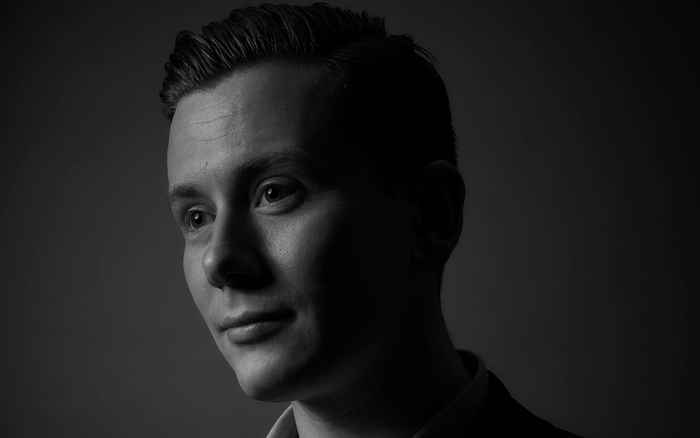‘The robe fits me like a glove’
Interview with lawyer Tim Vis
13 April 2022

As a child, Tim Vis already wanted to become a lawyer. He enjoyed watching the lawyer series The Practice with his parents, about a Boston firm that mainly assists the outcasts in American society. 'I recently watched the series again', says Tim, 'The ethical themes are very accurate. It amazes me that I recognise so much from daily practice. Particularly about assisting the underdog against the state.' He continues: 'If you claim to be a civilised society, you take care of those who might be oppressed. I think it's extremely important that the government sticks to its own rules.'
Tim is therefore happy to provide assistance within the social law practice. He assists people on the basis of government-funded legal aid. Recently, he assisted an addicted asylum seeker who had stolen a bait bag from the police. 'The legal sting is often in these seemingly small cases', Tim explains. 'The cases in which you think: are the police allowed to use such a bag? Can the police stop someone for a preventive search in the middle of the street?' He is happy with the alternation in his practice between big cases and assistance to 'outcasts'. 'In those kinds of cases, too, you see constitutional dilemmas reflected.'
Huub Stapel
Tim still regularly thinks back to the Rhetoric course that he organised with fellow students and Emeritus Professor Eugène Sutorius and Professor Jeroen Bons. The students were allowed to invite guest speakers for the course. They were encouraged not to sit too low on the ladder. Actor Huub Stapel, for instance, gave a guest lecture. 'Huub's lecture was really great. He has played several roles in lawyers and had done a lot of research. He regularly sat in courtrooms and followed lawyers, copied their facial expressions and, as a layman, saw what makes a good plea.'
Tim still has a lot of contact with Eugène Sutorius: 'Another legal passion that we share is the law of euthanasia and assisted suicide. Eugène was the main lawyer and one of the experts in that field and was chairman of the Dutch Association for a Voluntary End to Life. For Tim, he is still a valuable mentor and sparring partner. Tim says: 'Eugène involved me in the defence of Albert Heringa, the man who helped his 99-year-old mother with her self-chosen end of life. In the meantime, I also have quite a substantial practice in the field of euthanasia and assisted suicide.' Tim calls it a hot topic, because there is a lot of legal attention, but also social attention for it at the moment. 'It is a very special subject, which is constantly changing.'
A doctor who performs euthanasia has considered this extremely carefully. I think that criminal law should stay far away from that.
A cold wind in the Public Prosecution Office
'Since the euthanasia act of 2002, no one has really bothered about it. The doctors were assessed by the review committees. The Public Prosecutor's Office would talk to a doctor if something did not appear to have gone entirely smoothly. Lessons were learned for the future and that was that. Since 2018, a different, very unpleasant wind has blown through the Public Prosecution Service. There is heightened attention for all law relating to the end of life. Both the doctors involved are subjected to closer investigation and further criminal intervention, as well as the relatives who assist their loved ones in their own end of life.'
Tim feels that it does not do justice to the very intimate decision to end one's own life. 'I think it's important that you can do that with someone close. You don't die alone. But also for doctors I think it expresses an unbelievable mistrust that is totally unjustified as far as I'm concerned. I have spoken to many doctors about this subject. A doctor who carries out euthanasia has considered this extremely carefully. I think that criminal law should stay very far away from that.'
'The Public Prosecutor's Office has chosen to bring criminal law back into the debate on euthanasia. I think this is an incorrect development, but at the same time I am honoured that I can now make an active contribution in many such cases. It is very challenging and it gives me great satisfaction, as a lawyer, to operate precisely in the area between what is legally interesting and what is socially relevant. This is pre-eminently such a subject and that is what makes my professional heart beat faster.'
Someone's lawyer, not a bosom friend
We ask Tim if, as a criminal lawyer, he also experiences fear. '18 September 2019 is a key moment,' he replies. 'The murder of Derk Wiersum lives in every criminal lawyer's mind and will continue to do so. Our profession really changed on that day.' A strong role stability and a very conscious role ethic help to stay on the right track, Tim believes: 'I am a lawyer who has and observes pretty strict professional ethics standards. We are independent towards our client and towards the judiciary, towards everyone. I am someone's lawyer, not someone's bosom friend.' He has also noticed a hardening of attitudes. 'I, too, have personally experienced death threats. I don't blame the person for it, but it was very unpleasant. It's not part of the game in the sense that you take it for granted. But it is something that has unfortunately become part of the dynamics of our profession.'
Where does Tim see himself in the future?
'The robe fits me like a glove. Not only in the literal sense, but also figuratively. I don't see myself taking it off just yet. Nevertheless, I have always had the ambition to return to the academic world at some point. I find international criminal law particularly interesting. In practice I have little to do with it, but academically it still stimulates me.